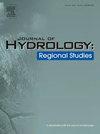应用自定义灌溉水质指标评价灌溉用地下水水质
IF 4.7
2区 地球科学
Q1 WATER RESOURCES
引用次数: 0
摘要
研究区域摩洛哥东北部angads平原研究重点本研究旨在通过引入一种新的定制灌溉水质指数(CIWQI)来评估用于灌溉目的的地下水质量,通过使用因子分析适应当地的水化学特性来提高精度。研究结果表明,受自然和人为因素的影响,研究区地下水质量具有高度的变异性。一些井含有优质的水,适合没有重大限制的灌溉,而另一些井含有高浓度的溶解盐,限制了它们的农业用途。常规指标(SAR、Na%、KR和MH)不存在季节变化,但CIWQI指数表明,湿润期水质较好(53.3% %的样品属于中等至良好),而干燥期水质较好(22.2% %的样品属于中等质量)。这个指数更好地适应了当地的特点,更准确地反映了季节变化。这项研究强调,使用适应当地环境的指数能够更准确地评估水质。本文章由计算机程序翻译,如有差异,请以英文原文为准。
Assessment of groundwater quality for irrigation using a new customized irrigation water quality index
Study region
Angads plain, Northeastern Morocco
Study focus
This study aims to assess groundwater quality for irrigation purposes by introducing a new customized irrigation water quality index (CIWQI) to improve precision by adapting to local hydrochemical specificities using factorial analysis.
New hydrological insights for the region
The results reveal a high degree of variability in groundwater quality in the study area, influenced by both natural and anthropogenic factors. Some wells contain good quality water, suitable for irrigation without major restrictions, while others have high concentrations of dissolved salts, limiting their agricultural use. Conventional indices (SAR, Na%, KR and MH) did not show seasonal variations, but the CIWQI index showed that water quality is better during the wet period (53.3 % of samples classified as moderate to good quality) compared to the dry period (22.2 % moderate quality). This index, better adapted to local specificities, more accurately reflects seasonal variations. The study underlines that the use of indices adapted to the local environment enables a more accurate assessment of water quality.
求助全文
通过发布文献求助,成功后即可免费获取论文全文。
去求助
来源期刊

Journal of Hydrology-Regional Studies
Earth and Planetary Sciences-Earth and Planetary Sciences (miscellaneous)
CiteScore
6.70
自引率
8.50%
发文量
284
审稿时长
60 days
期刊介绍:
Journal of Hydrology: Regional Studies publishes original research papers enhancing the science of hydrology and aiming at region-specific problems, past and future conditions, analysis, review and solutions. The journal particularly welcomes research papers that deliver new insights into region-specific hydrological processes and responses to changing conditions, as well as contributions that incorporate interdisciplinarity and translational science.
 求助内容:
求助内容: 应助结果提醒方式:
应助结果提醒方式:


